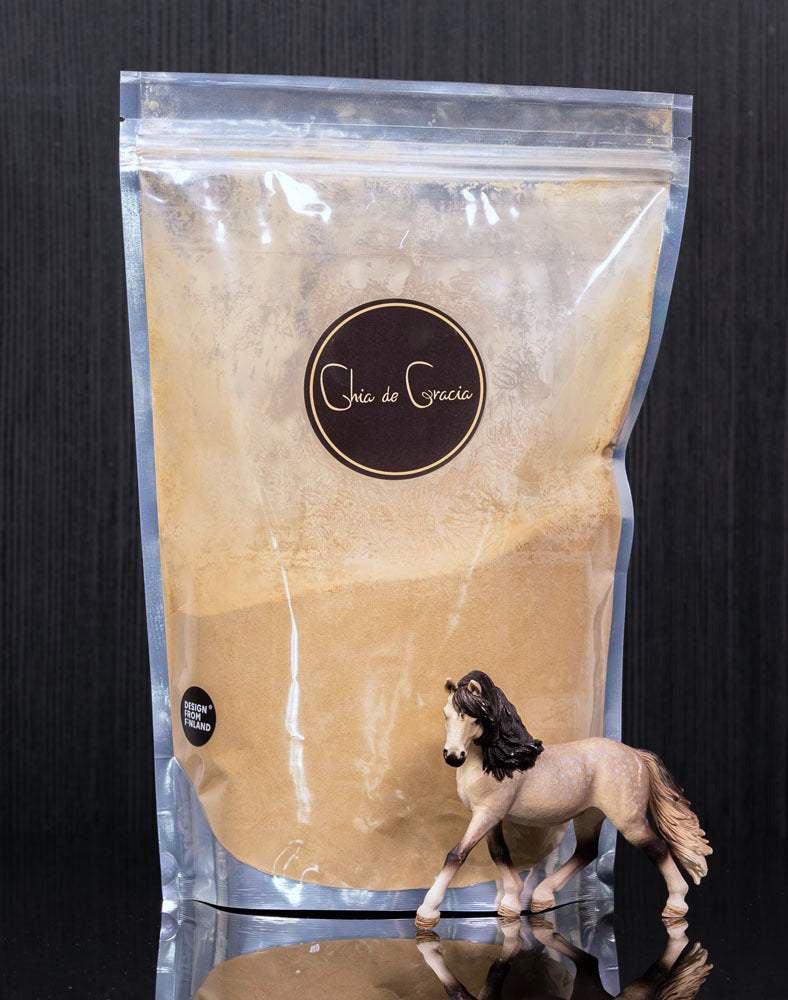Chia de Gracia
Lecithin 900 g
Delivery time 5-7 days
Couldn't load pickup availability
Lecithin consists largely a phospholipid called phosphocholine, which is an essential building material of cell membranes. The phospholipid called choline, is very effective in body fat metabolism. Choline transports fats, muscles, tissues, where they are used as a source of energy. In this way, lecithin can change body fat into energy very efficiently. Choline can also carry out fat of the liver and balance liver function.
Phosphocholine passes the outer surfaces of the cell membranes, which improves the communication between cells. For this reason, the lecithin is said to improve memory.
Active exercise and concentration work eequires a lively nerve activity. Choline is an essential building material of body's main nerve impulses broker substance acetylcholine. Acetylcholine acts as a mediator of nerve impulses in the muscles and the brain. Lecithine may be useful to many aging horses.
Lecithin and choline intake from food is emphasized in physical exertion and the growth, but the regeneration of cells and tissues is also necessary for older horses. Peripheral vascular slowdown is a normal condition of aging. The body's blood circulation slows down and the nerve linkages becomes brittle. Therefore, it is important to ensure that the remaining connections functions effectively. Lecithin befits a natural source of acetylcholine also for older horses.
Lecithin is a good addition for horses suffering from sensitive stomach, because it has the ability to neutralize strong stomach acids. Lecithin strengthens the intestinal water-repellent surface layer and can thus protect and strengthen the gastric mucous membrane, as well as to speed up the healing of existing ulcers. Phosphatidylcholine improves the fat-soluble vitamins A, D, vitamin E absorption in the gastrointestinal tract. With regular use of lecithin to strengthen the immune system.
Several supplements developed for the treatment of gastric ulcers includes lecithin and pectin. These have been found to be an accelerating effect on the healing of ulcers.
Treatment of gastric lesions in horses with pectin-lecithin complex:
https://www.ncbi.nlm.nih.gov/pubmed/10696303
Dosage:
horse 500 kg
2 - 5 tbsp / day.
To support the well-being of the stomach, 50-150 g / day in 2-4 week courses.
Watered and mixed with other feed, not fed dry.
1 dl weighs about 45 g.
Always start with a lower dosage. The portion can be divided into several feeding times.
Tip: the pectin from the apple protects the mucous membranes of the stomach together with lecithin.
Nutritional content 100g:
fat 84.00 g (saturated) 12.00 g), carbohydrates 3.00 g, sugars 3.00 g, protein 0.05 g, salt 0.75 g, (sodium 0.30 g), calcium 0.14 mg.
Share





